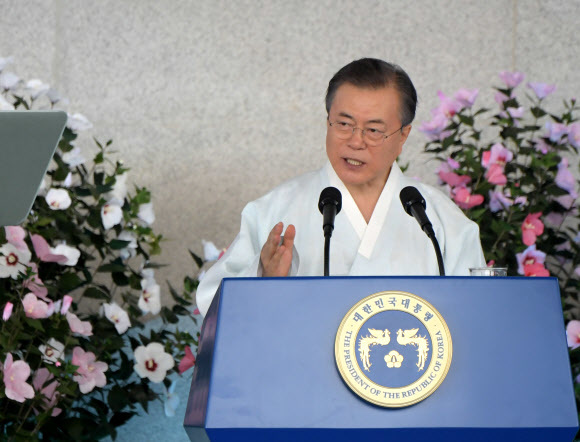 |
|
South Korean President Moon Jae-in delivers his Liberation Day celebratory address at the Independence Hall of Korea in Cheonan, South Chungcheong Province, on Aug. 15. (photo pool)
|
Seoul says it is “prudently reviewing” option of renewing agreement without sharing intelligence
As the deadline for the South Korean government to renew its participation in the General Security of Military Information Agreement (GSOMIA) approaches on Aug. 24, the next question is which decision Moon Jae-in administration will make regarding the agreement. South Korean officials have considered withdrawing from GSOMIA as a way to counter Japan’s decision to remove South Korea from its “white list” (countries that enjoy expedited screening on the exports of strategic materials). All parties to GSOMIA reaffirm their participation in the agreement on an annual basis; however, GSOMIA is automatically terminated if any party to the agreement announces its intent to withdraw 90 days before the annual renewal deadline. Even as recently as Aug. 18 the South Korean government said that it was “prudently reviewing” a decision to withdraw from the agreement. South Korean officials view such a stance as a way to pressure Japan, and appear intent to maintain its so-called “strategic ambiguity” on the issue. A South Korean Ministry of National Defense (MND) official told the Hankyoreh that “GSOMIA is still in force” and that there has been “no decision as of yet” to leave the agreement. A former high-level MND official involved in GSOMIA’s renewal last year told the Hankyoreh that “annulling GSOMIA is a South Korean decision” and that there’s a need for South Korea to hold on to the option of leaving the agreement until the “very last possible moment.” The Moon administration is currently weighing the benefits and disadvantages of withdrawing from GSOMIA. If it decides to renew its participation in the agreement, South Korean officials are concerned that such a decision could show weakness toward Japan and bring the Moon administration under domestic criticism. They are also concerned that such a decision could send the “wrong signal” to the Shinzo Abe government and Japan’s right-wing politicians. GSOMIA is a building block of the US’ missile defense system in the region, which is ultimately aimed at keeping China in check in Northeast Asia. Many analysts have pointed out that GSOMIA may become the foundation for the continuation of the regional alliance between the US, South Korea, and Japan. Some observers suggest that South Korea’s “strategic ambiguity” is really a strategy aimed at finding a way out of the current situation. If the South Korean government backs out of GSOMIA, it may seem as if South Korea “destroyed” the structure of cooperation among South Korea, Japan, and the US in the Pacific region. Such a move could lead to a counter-attack by Japan on South Korea. They argue that Seoul’s strategic ambiguity is providing the South Korean government with a way to pull back from the brink if necessary. The Moon administration’s ambiguity on GSOMIA has also likely been impacted by US Secretary of Defense Mark Esper’s announcement during a recent trip to South Korea that he hoped South Korea will renew its participation in GSOMIA this year. Furthermore, Moon emphasized his intention to pursue dialogue with Japan during his Liberation Day celebratory address on Aug. 15, and refrained from making any mention of GSOMIA. Some quarters in the Moon administration and ruling party are suggesting that one option going forward is for South Korea to renew GSOMIA but halt or restrict the flow of military intelligence with Japan. This option, they say, could mollify the Americans by keeping the framework of GSOMIA alive, while also effectively putting the Japanese at a disadvantage. This proposal was borne from the fact that GSOMIA does not stipulate that signatories have to share military-related intelligence. During a meeting of the party’s special advisors last week, a Democratic Party representative told the Hankyoreh that participants introduced a plan that would renew GSOMIA this year but temporarily halt the sharing of intelligence until Japan makes tangible moves on its export restrictions toward South Korea. Democratic Party leader Lee Hae-chan reportedly believes that this plan is “very practical.” A Moon administration official also noted that, in his own personal opinion, South Korea has the option to “renew GSOMIA but halt any exchange of military-related intelligence for the time being.” During an open debate in the National Assembly Building on Aug. 14, Cho Sung-ryul, a research consultant for the Institute for National Security Strategy, further noted that South Korea has the option to “maintain the framework for cooperation among South Korea, Japan, and the US and retaliate against Japan if it renews GSOMIA but temporarily halts the sharing of intelligence.” By Yoo Kang-moon, senior staff writer, and Kim Kyu-nam, staff reporter Please direct comments or questions to [english@hani.co.kr]






